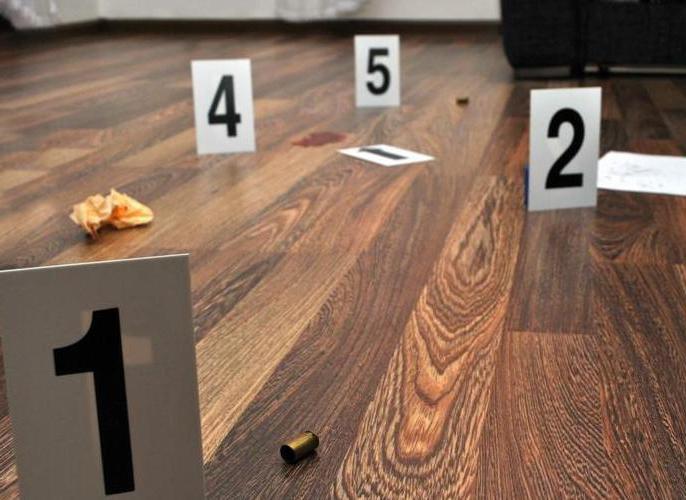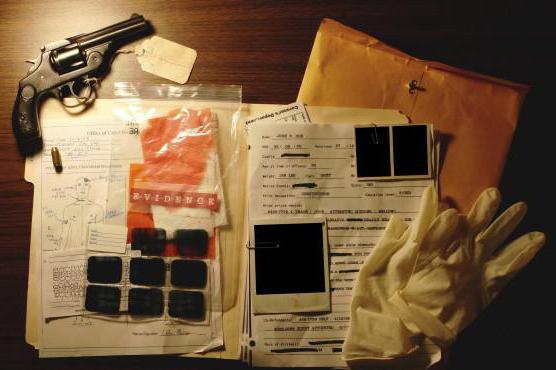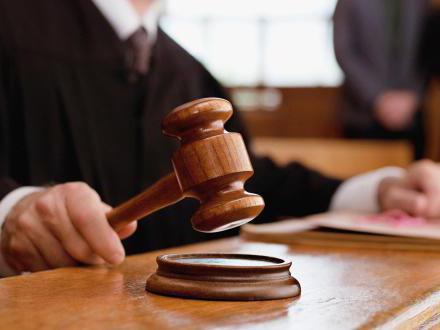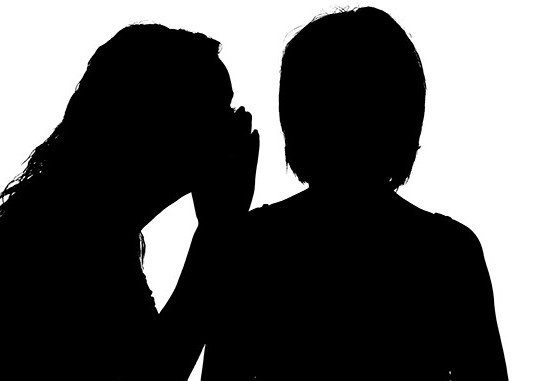The collection of evidence is considered a mandatory stage in criminal proceedings. This is usually done by the investigator or interrogator. The law establishes the rules according to which an authorized employee collects evidence. In case of violation, the materials and information received will not be attached to the case. Consider further what constitute admissible and unacceptable evidence in criminal proceedings. 
General information
The concept of unacceptable evidence in criminal proceedings disclosed in the CPC. Article 75 provides their characteristics, as well as their open list. Inadmissible evidence in criminal proceedings - these are materials and information obtained in violation of the requirements established by the CPC. They do not have legal force. Such materials cannot be used on the basis of the charge and in proving any circumstance enshrined in Article 73 of the Code of Criminal Procedure.
Scroll
In part 2 of article 75, the legislator cites certain categories of information that appear as unacceptable evidence in criminal proceedings. Among them:
- Testimony of a witness who cannot name the source of information.
- Information received from the accused / suspect in the absence of a defense counsel (including in case of refusal from him) before the hearing, not confirmed by the indicated persons at the meeting.
- Testimony of a witness / victim based on guesses, rumors, assumptions.
- Other information obtained in violation of the provisions of the Code of Criminal Procedure.
Explanation
As can be seen from Art. 75, admissibility should recognize the conformity of evidence with the requirements established in the CPC. In particular, we are talking about the proper procedural form. Deviation from it may lead to the deprivation of information and materials collected during the proceedings, legal force and the impossibility of their subsequent use by the prosecution.
Part one of article 75 indicates that as grounds for declaring evidence inadmissible in criminal proceedings advocates their inconsistency of the CPC. Meanwhile, the Constitution provides for an additional circumstance. In particular, in Art. 50 (part 2) indicates that materials and information obtained in violation of federal law are also considered as notadmissible evidence.
In criminal proceedings in the event of a conflict, the constitutional norm will take precedence. In this regard, according to a number of lawyers, the provisions of paragraph 1 of Article 75 of the CPC must be interpreted broadly. 
Example
Suppose, operational officers carried out a control purchase of a narcotic substance with penetration into a room against the will of the citizens living in it without obtaining permission from the court. The corresponding requirement is established by Article 8 of the Federal Law "On Operational Activities".
If the narcotic substance, as well as the banknotes found in the premises, were examined with the observance of the procedural rules, then, within the meaning of paragraph 1 of Article 75 of the Code of Criminal Procedure, they should be considered admissible. In fact, the requirements of the Code were not formally violated.
Meanwhile, the committed actions contradict the requirements of the specified Federal Law. Accordingly, the detected objects act as nadmissible evidence. In criminal proceedings It is important that all procedures provided by law are followed. Otherwise, cases of violation of constitutional rights and freedoms of the individual are likely.
Lack of defender
Part two contains an open list of circumstances of obtaining information and materials during the preliminary investigation, entailing recognition of evidence inadmissible.
In criminal proceedings one of the most important principles is the observance of the rights and freedoms of a citizen. Legislation provides a person with the opportunity to take advantage of the assistance of a lawyer. A citizen may exercise this right or refuse it.
The testimony given by the suspect / accused must be confirmed by him at the hearing. This requirement is aimed at preventing self-incrimination, preventing consent with the prosecution under the influence of mental or physical effects.
The condition for the absence of a lawyer applies to cases where a person has refused him. This creates certain obstacles for unscrupulous employees trying to persuade the accused / suspect to allegedly voluntarily express their will not to use the assistance of a defense attorney. 
Accuracy of information
Considering unacceptable evidence in criminal proceedings, signs of this information and materials, attention should be paid to the characteristics of their sources. This is stated in paragraph 2 of part two of article 75. The norm states that information received from the victim / witness and based on rumors, conjectures, and assumptions cannot be accepted as confirmation of certain circumstances of the incident.
This requirement indicates that only data on specific facts that have taken place have legal force. That is, the subject must be firmly convinced of the reliability of his information. Information based on guesses, rumors, as well as taken from sources whose origin the citizen cannot describe, is very difficult to verify. It is unlikely that in the framework of the proceedings it can be considered reliable.
Nuance
When analyzing unacceptable evidence in criminal proceedings, the main signs of such information provided by law, it is necessary to pay attention to one important point. In the second paragraph of part 2 of article 75, the testimony of a witness taken from a source whose origin he cannot describe is not accepted in the proceedings.
Meanwhile, such a restriction is not established for the victim. The absence of an appropriate indication in the norm is probably due to the fact that the victim himself is the primary source of information. Accordingly, he is unlikely to be able to testify rumored.
Controversial issues
Clause 3 of Part 2 of Part 75 of the Code of Criminal Procedure stipulates that other than the materials described above, information and information obtained in violation of the requirements of the Code shall be deemed inadmissible.
It is widely believed that any deviation from the procedural rules relating to the collection and verification of information leads to the loss of its legal force. Meanwhile, it is necessary to understand that in the considered norm we are talking about violations of the Code as a whole, but not its specific provisions.
If the legislation provides for ways and means by which to prevent recognition of evidence inadmissible in criminal proceedings, confirming that the violations did not have a significant impact on the observance of the principles of production, with their effective application it cannot be said that the materials and information were used to certify certain facts illegally.
For example, the investigator did not warn the witness about the right not to testify against himself and his relatives. This action certainly violates the established procedural rules. If it is proved (by the witness’s explanation, among other things) that this fact didn’t affect the voluntary nature of the testimony and, accordingly, the preservation of the equality of the participants in the trial, the court may recognize the information received as lawful and relevant to the case. 
Permanent and refutable violations
They are actions whose results can be corrected. If it is established that non-compliance with the procedure has led to a real violation of the principle of competition, the information and materials obtained during it must be considered legally void.
Accordingly, the committed acts are unrecoverable. These, for example, include obtaining evidence from a witness with the use of force, torture, cruel treatment, degrading his dignity and honor.
Such actions do not meet the requirements of justice, equality of arms. At the same time, not all violations, including fatal ones committed during the production, are considered significant upon receipt of evidence.
For example, the presence of persons under the age of 16 at a hearing is considered as non-compliance with legal requirements. Moreover, this violation does not matter for the procedure for obtaining the information necessary for the production.
Inadmissible evidence in criminal proceedings: types
According to lawyers, information obtained from: acts as information that cannot be taken into account in the framework of the proceedings;
- The use of psychological or physical violence against the subject, as well as methods that can disrupt the person’s ability to adequately perceive what is happening and make decisions.
- By direct misrepresentation regarding the rights of a citizen. This category of violations should also include omission of legally possible opportunities in situations where, without explanation, ensuring the equality of arms is impossible.
- A limitation in proving the circumstances of production is the study of derivative sources of information if it is possible to provide information from the source. In this case, the equality of the subject against which they are directed is also violated. unacceptable evidence in criminal proceedings. Arbitrage practice based on the fact that verification of information from derived sources is very difficult. Accordingly, it is impossible to reliably establish the veracity of the information. For example, the announcement of the protocol of the interrogation conducted with the witness, instead of his direct interrogation, deprives another participant in the proceedings of the opportunity to ask this person questions.

Additionally
Information collected by authorized employees, in respect of which challenges may be claimed by virtue of circumstances that are essential for the continuation of the proceedings, are also considered as unacceptable evidence in criminal proceedings.
Judicial practice proceeds from the fact that the subject composition of legal relations must be appropriate. The challenge to any of the participants in the production can be declared for various reasons.
For example, if a person has an interest in the outcome of a case. In addition, in the event of an unlawful change in the subject composition that could upset the balance in favor of any of the participants, the information collected after this is considered as unacceptable evidence.
rules
The current CPC provides procedure for declaring evidence inadmissible. In criminal proceedings All participants have certain rights. Among them is the opportunity to file motions. Under article 88, if there are appropriate circumstances, the investigator, prosecutor, interrogating officer must observe the procedure for recognizing evidence as inadmissible.
In criminal proceedings, a petition is considered the main factor triggering this procedure. It may be filed by the accused or suspect. In addition, the prosecutor, the inquiry officer or investigator may take their own initiative if they have doubts about compliance with the procedures for obtaining information.
Violation Results
What are consequences of declaring evidence inadmissible in criminal proceedings? As mentioned above, materials and information collected in violation of the rules lose their legal force. This, in turn, entails exclusion of unacceptable evidence.
In criminal proceedings entities taking part in it have the right to appeal against actions / inaction and decisions of authorized employees, including those related to the attachment of materials collected illegally.
It seems that one can challenge the refusal to satisfy a request (petition) for the collection of information directly related to the proceedings. 
Eligibility Criteria
The admissibility of evidence is determined by the following indicators:
- Information received by the proper person. It is, in particular, about a subject endowed with the authority to perform procedural actions.
- Information obtained from the proper source.
- A legal action has been taken to collect information.
- The procedural order of the investigative or judicial measures is observed.
Inappropriate subject
The CPC has an exhaustive list of persons authorized to collect evidence. They include an investigator, defender, interrogating officer, prosecutor. The court also appears on the list. Accordingly, the records of investigative measures cannot be attached to the case if there is no resolution on:
- Taking employees to production.
- Creation of an investigation team (group).
- Transfer of the case to another authorized body.
Evidence is considered invalid if:
- There is no separate order for another authorized employee to conduct an investigative action.
- The activities of the interrogator were conducted without initiating proceedings.
- The verification of materials was carried out for more than 10 days.
- Violations of the principles of jurisdiction / jurisdiction were committed.
Inappropriate source
Invalid are the information received:
- From a person who is not able to adequately perceive what is happening, in view of their mental or physical characteristics.
- From a subject who cannot indicate the source of information.
- From minors 14-16 years old, interrogated in the absence of a teacher.
- Without warning relatives of a citizen about the rights enshrined in 51 articles of the Constitution.
- On behalf of a person interrogated as a witness, if he is involved in the case in the status of a suspect.
- Without a citizen identity check.
Written explanations, statements certified by a notary, including if, according to the rules of the CPC, the information should be recorded in the protocol, will also be considered an improper source. 
Expert opinion
In some cases, research results can be recognized as inadmissible evidence. This situation occurs if the expert:
- To be challenged due to incompetence.
- I went beyond my knowledge.
- He was not warned of responsibility for the provision of a deliberately false act (conclusion).
- He participated in the proceedings as a specialist, previously audited or has a different interest in the outcome of the case.
Document Retrieval
The following protocols are subject to exclusion from production materials:
- Voluntary extradition, if they are issued instead of the act of seizure.
- Exemptions, if drawn up in lieu of search protocols.
- Verification of testimonies on the spot, if inspection certificates should be completed with the participation of a witness, accused, suspect or investigative experiment.
findings
At present, quite a lot of publications are being published in which unacceptable evidence in criminal proceedings is examined (a textbook edited by Kalinovsky and Smirnov, for example). As a rule, they contain special sections devoted to the problem of collecting and introducing information and materials to the case.
In addition, the authors give quite extensive lists of possible violations of the requirements of the law. Usually these lists remain open.As already indicated above, in order to declare the evidence inadmissible, the person concerned must file a motion. It indicates the request to remove a document or other storage medium from the case file.
It should be borne in mind that the subject, when submitting such a petition, enters into a fight with the prosecution. The burden of proving the legitimacy of the information presented lies with the employee who collected it. However, the position of the objection should also be justified.
In such situations, you often can not do without the help of a qualified lawyer. He will act as a kind of guarantor of compliance with procedural rules, because by law, he is one of the entities authorized to collect and provide evidence in the case.
The winner will ultimately be the one who is able to justify the legitimacy of his actions, referring to specific provisions of regulatory acts.